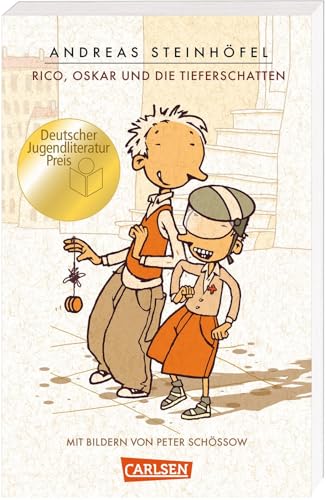Can a boy who is “lowly gifted” be the one to solve a mystery that has stumped the entire city?
“Rico, Oskar and the Deeper Shadows,” by German author Andreas Steinhöfel, is a remarkable detective story for middle-grade readers that introduces two endearing and unconventional heroes. The story is narrated by Rico, a self-proclaimed “lowly gifted” boy who sometimes gets his thoughts mixed up, but who sees the world with a unique and wonderful clarity. When the infamous kidnapper known as Mister 2000 terrorizes his Berlin neighborhood, Rico’s quiet life of observing the comings and goings from his apartment window takes a dramatic turn. He soon befriends the brilliant, anxious, and “highly gifted” Oskar, and together, this unlikely duo sets out to investigate the mysterious “deeper shadows” that lurk in their building and catch the criminal mastermind.
Set against the vibrant, multicultural backdrop of modern-day Berlin, the narrative authentically captures the sights and sounds of a bustling urban community. The story is not just a mystery, but a deep exploration of friendship, courage, and the acceptance of difference. Steinhöfel masterfully weaves themes of loneliness and family, challenging stereotypes about intelligence and disability. For young readers who may feel different themselves, Rico’s journey is particularly resonant; he demonstrates that perceived weaknesses can be profound strengths. The book also offers a valuable window into contemporary German life, fostering an understanding of a culture beyond clichés and allowing them to see the universal experiences of childhood friendship and bravery through a fresh lens.
Andreas Steinhöfel is one of Germany’s most celebrated authors for young people, and his own experiences living in Berlin lend a palpable authenticity to the setting and its diverse cast of characters. “Rico, Oskar and the Deeper Shadows” was awarded the prestigious Deutscher Jugendliteraturpreis, a testament to its exceptional quality. This book is more than just a clever mystery; it is a powerful lesson in empathy and perspective. It deserves a place in every classroom and library for its ability to start conversations about neurodiversity and the simple, profound truth that everyone has a unique way of seeing the world. The story will linger with readers long after the last page, reminding them that true friendship is about embracing each other’s quirks, shadows and all.

